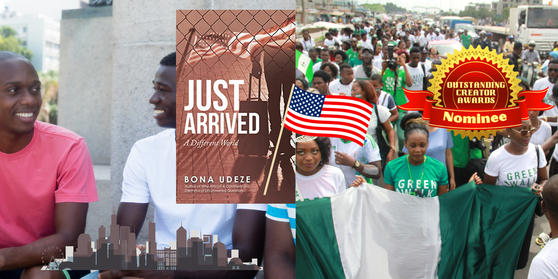|
Score: 95/100 (9.5 out of 10)
WOW! What an incredible journey! This is the fascinating story of a Nigerian-American immigrant named Emeka as he acclimates to his new life in Chicago, Illinois USA. He comes with the idea that America is a great land of tremendous opportunity, equal opportunity, fairness, and wealth, but is confronted with the realities that Americans are still fallible and flawed human beings, taxation is a thing, capitalism has its vices, and corruption still exists even at the highest levels of government. Perhaps the saddest thing he learns about America is that racism and, specifically, racial-profiling is prevalent. Several times throughout this story, this well-meaning and innocent Nigerian immigrant who is still learning English is pulled aside or even arrested and interrogated by police for matching the description of a Black suspect. It is tragic to read about and, as an American, downright frustrating and embarrassing. It shouldn't be this way, but it is. Interestingly, Emeka's understanding of social norms from his upbringing in Nigeria are constantly challenged. For example, he is shocked when people have children out of wedlock or get married before the age of 19. He is shocked to hear an American politician swear. He is shocked when police officers react with hostility when offered a bribe instead of accepting it. He is confused when people don't refer to each other by titles like “Mister” and “Misses.” He is flabbergasted when he receives a paycheck that is a lot less than expected because of state and federal taxes, Medicare, and social security. That is, perhaps, the most relatable thing we've ever read from a book of this nature: more than falling in love, losing a loved one, or even stubbing your toe—it's being robbed by Uncle Sam that's most relatable. What employee in America hasn't felt that way before? His anger and frustration at this is raw and entirely understandable, especially when he states that he'd already had plans for that money like sending some of it proudly to his family. His jaw also drops at the insane prices of American goods, services, and just the plain cost of living. He regularly walks four miles to and from work every day just to save money for transportation. He regularly doesn't eat normally to save money because a bottle of water at a restaurant is $1.75 and soda is over $2. These are very understandable, human struggles that Emeka seems to face with a courageous and positive attitude most of the time, though he often hides this behavior out of shame and embarrassment. He also begins to hide his food or heat it up in private because he is nervous that people think it looks strange or smells bad. He is incredibly socially awkward by American standards, mostly because he doesn't understand certain words and phrases out of context. For example, he takes offense to being called a “pretty smart guy” because in his mind he associates the word “pretty” with being feminine or girly. He doesn't understand how an animal can be called “cute” because he thinks the word “cute” is an adjective intended to describe someone like a child. There are a lot of nice little twists and layers to this story, such as when we hear about a prince from Emeka's home country who had a homeless and mentally disabled nephew who had robbed a poor woman. What's also very powerful and amazing about this book is that despite all the terrible things that Emeka sees and experiences, particularly from police, he still believes in the greatness and promise of America. This positive outlook despite all the challenges is why we root for Emeka and want him to find happiness. There is also another good character in this book named Nicole who serves as Emeka's love interest through the course of the story, and the little surprise at the end is worth reading on for. Check out this book on Amazon today!
0 Comments
Leave a Reply. |
Archives
July 2024
Categories |

 RSS Feed
RSS Feed